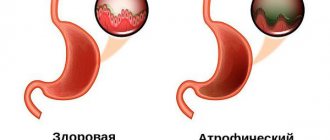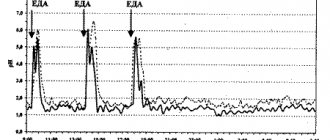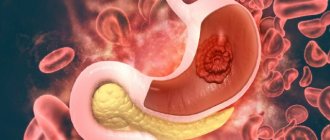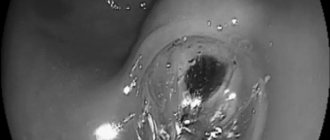Indigestion is a disease that is considered one of the most common disorders of the intestinal tract in our time. It is also known by another name - dyspepsia. Almost every third representative of the adult population complains of disorders of this type. It implies a violation of the basic functions of the organ, manifested by a number of unpleasant symptoms. What to do if you have an upset stomach?
Functional dyspepsia
Functional dyspepsia - for this diagnosis the following conditions are necessary:
- Symptoms of dyspepsia are constant, recurring, and last more than 12 weeks throughout the year.
- Upper gastrointestinal endoscopy does not reveal the organic diseases listed above.
- There is no irritable bowel syndrome (symptoms do not disappear after bowel movement and are not associated with changes in the nature of stool or its frequency).
Causes of functional dyspepsia
- excess production of hydrochloric acid;
- nutritional disorders (nutritional errors);
- taking certain medications;
- stress;
- infection of the gastric mucosa with a specific microorganism - Helicobacter pylori;
- disturbances in the motor function of the stomach and duodenum.
There are certain “alarm symptoms” that should alert the patient and the doctor, since they are not typical for functional dyspepsia:
- night pain;
- anorexia, vomiting;
- growth retardation in children;
- fever and joint pain;
- blood in stool;
- frequent epigastric pain of the same type, irradiation of pain.
The causes of dyspepsia are not fully understood. But it is known that the main one can be long-term poor nutrition with significant “distortions” in favor of certain food groups. In this case, fermentative, putrefactive and fatty dyspepsia are distinguished.
Causes of indigestion
Stomach upset can occur due to other illnesses.
This disease can occur for a variety of reasons. So, some people suffer from indigestion after quick snacks or after some unexpected interruptions in their diet. Other patients note the occurrence of dyspepsia against the background of certain stomach diseases:
- ulcers
- gastritis
- increased stomach acidity
Dyspepsia can also appear as a result of taking various medications that affect the intestinal microflora, if the latter is not supported by additional means intended for this.
Sudden changes in climatic conditions, in some cases, cause permanent stomach upset, which is especially important for people who love to travel. Other reasons that provoke the occurrence of dyspepsia include:
- starvation
- decreased immunity
- excessive drinking
- excessive consumption of fatty, salty foods
- various mental disorders
Sometimes indigestion can occur spontaneously, not due to other gastrointestinal diseases. In this case it is called functional. Dyspepsia of this type develops due to overeating, excessive consumption of drinks that are made as a result of fermentation, as well as when consuming fatty foods and products that contain a predominance of carbohydrates and plant fiber.
Expectant mothers are especially at risk of developing dyspepsia, since during pregnancy it can occur due to the following factors:
- increased stomach acidity
- food poisoning
- lack of diet
- as a result of exacerbation of chronic gastrointestinal diseases
Treatment in this case should be carried out under the mandatory supervision of a doctor who can prescribe safe and effective therapy for the disease.
Indigestion, also known as dyspepsia, is a violation of the main functions of the organ that occurs for a number of reasons.
Fermentative dyspepsia
Fermentation dyspepsia is associated with an excess of carbohydrates in the diet (sugar, honey, flour, sweet fruits, grapes, legumes, cabbage), coarse plant fiber, and fermented drinks (for example, kvass). One of the important causative factors is insufficiently thorough chewing of food. As a result, favorable conditions are created in the intestines for the development of microorganisms that support fermentation processes.
It is manifested by flatulence (excessive gas formation in the intestines), frequent passage of gases, increased peristalsis, rumbling in the abdomen, frequent loose, foamy, slightly colored stools with a sour odor. A scatological examination (study of stool samples) reveals an abundance of starch grains, fiber, and organic acids. Feces give an acidic reaction.
Diseases that are accompanied by indigestion
Helicobacter pylori can cause peptic ulcers.
Various gastrointestinal diseases are organic causes of dyspepsia. This is facilitated by various factors, among which the most important is the infectious factor. The bacterium Helicobacter pylori infects almost a third of the population.
This type of bacteria is dangerous for humans because they are the main cause of the development of diseases such as gastritis, gastric and duodenal ulcers.
The pathogenic microorganism is particularly adaptable compared to many other bacteria - the thing is that it is able to survive even in the hydrochloric acid that makes up gastric juice - the powerful defense system of the human body.
As a result of the vital activity of Helicobacter pylori, damage and destruction of the tissues of the mucous membrane of the organ occurs, which allows the microorganism to penetrate into the upper layers of its walls and multiply there. It is this effect that causes such well-known and unpleasant peptic ulcers. The most common gastrointestinal diseases resulting from exposure to the Helicobacter bacteria can be divided into three types:
Fatty dyspepsia
Fatty dyspepsia (sometimes also called “soapy”) can be triggered by excessive consumption of indigestible refractory fats (pork, lamb).
The stool is usually light-colored, abundant, difficult to flush down the toilet, and has a “greasy” sheen. Coprology reveals large amounts of undigested fat, fatty acids and their insoluble salts. The stool gives a neutral or alkaline reaction.
Chronic dyspepsia is characterized by intermittent diarrhea and constipation. Often this reveals intolerance to certain types of food, “functional weakness” of the gastrointestinal tract.
Symptoms
Symptoms that accompany dyspepsia:
- at night there is pain or discomfort in the epigastric region;
- increased gaseousness in the stomach and intestines;
- feeling of fullness for no apparent reason (during hunger);
- other symptoms of digestive disorders (nausea, belching, heartburn).
Form of the disease
It is customary to distinguish the main forms of dyspepsia:
- Organic dyspepsia is a structural change in the gastrointestinal tract (component organs have changed their position, organ pathology).
- Functional dyspepsia is a less severe type of disease when the digestive organs do not perform (or partially perform) their functions.
Subtypes of the disease
Nutritional dyspepsia. Happens:
- fermentation An excess of carbohydrates in the daily diet is the main cause of the disease. Products that stimulate dyspepsia: flour products, sweets, fruits, vegetables, which cause gas formation in the gastrointestinal tract. Products also include drinks that cause fermentation and proliferation of yeast in the intestines (kvass, beer). As a result, flatulence appears in the intestines under the influence of yeast. The stool becomes frequent, liquid and foamy with a faint color and a sour odor.
- putrid. Protein products give rise to this disease. Namely: meat, fish, eggs. They take a long time to digest and cause organ dysfunction. Putrefactive dyspepsia can also occur when taking stale protein products in small quantities. The products of decay in the digestive tract give rise to general fatigue and lethargy of the body. As a result, the intestinal microflora is not filled with the necessary bacteria. Symptoms that accompany the disease: putrid odor of loose stool; metabolic disorders, urge to eat; decreased immunity;
- fatty. The cause is the intake of animal fats in unacceptable quantities.
Enzyme dyspepsia. Caused by a malfunction of organs that do not secrete digestive enzymes in sufficient quantities:
- gastrogenic (with a lack of gastric enzymes) - gastric dyspepsia;
- pancreatogenic (with a lack of pancreatic enzymes);
- enterogenous (with a lack of intestinal juices);
- hepatogenic (with a deficiency of bile secreted by the liver)
- cholecystogenic (poor functioning of bile secretion).
Dyspepsia caused by decreased intestinal absorption.
Infectious intestinal dyspepsia. Occurs when there is an infection (shigellosis or acute bacterial) in the intestinal microflora.
Intoxication intestinal dyspepsia. Occurs due to food poisoning (stale food, poisons), viral infections, surgical pathologies.
Functional dyspepsia is a condition when practically healthy people develop symptoms that are characteristic of stomach diseases:
- discomfort and even abdominal pain that does not stop even after repeated visits to the toilet;
- frequent belching;
- severe attacks of nausea and vomiting;
- an unpleasant feeling that the stomach is full;
- stool is frequent and irregular.
Causes
What are the reasons for this condition? A lot of them. Factors of a purely psychological nature – frequent stress, neurological diseases – may play a certain role. Overeating and poor nutrition should not be discounted. However, behind all this, more serious diseases may be hidden - chronic gastritis, stomach or duodenal ulcers, problems with the biliary tract, and with the pancreas. Bile backs up into the stomach (reflux). And what’s really unpleasant is that a tumor may have formed in the stomach, but you shouldn’t immediately conclude that it’s a malignant neoplasm. If a person has been taking some medications for a long time, it is quite possible that this is a reaction to them. Endocrine diseases can also give such a picture. And it is possible that local immunity is severely impaired. And in the case of women, it may turn out that these symptoms are caused by pregnancy.
Functional dyspepsia is divided into several types. The classification is based mainly on patient complaints. Descriptions of the following types are known: ulcer-like, dyskenitic, nonspecific. In the first case, patients are bothered by pain in the pancreas area; in the second case, a person feels heaviness in the pancreas area, nausea appears - after taking very little food, the person experiences a state of oversaturation. The nonspecific form is quite difficult to classify; patient complaints can be attributed to both the first and second forms of the disease.
Dyspepsia in children
Dyspepsia is also observed in children even at a very young age. Its cause is often overfeeding the baby, non-compliance with the diet, or sudden introduction of new foods into the child’s diet. The way the mother eats also plays an important role; it is quite possible that the cause of the child’s illness was unwashed fruit eaten by the mother or a glass of carbonated drink drunk, which is strictly not recommended for a woman to consume during pregnancy and lactation. It must be taken into account that the gastrointestinal tract of a small child is not yet fully developed, and, for example, an unbalanced diet, as well as side effects from pharmacological agents, may well lead to a similar condition. In adolescence, dyspepsia can be caused by changes in the body and imbalance of hormones. During this period, you should be especially attentive to the child’s complaints about his well-being, and not attribute them to reluctance to do something. In children, dyspepsia manifests itself almost in the same way as in adults, unless we are talking about serious illnesses. The stomach hurts, there is discomfort and heaviness in the abdomen. It is difficult to identify these symptoms in very young children who, due to their age, cannot explain what they feel, and crying is the only reaction to the processes occurring in their body.
More about fermentative dyspepsia
Depending on the causes that cause it, dyspepsia can be intestinal, hepatic, gastric, putrefactive, fermentative and fatty. Fermentative dyspepsia develops in spring or summer, that is, when it is hot. A person consumes a lot of liquid, which leads to the dilution of digestive secretions. Fermentative dyspepsia can be acute or chronic. Acute dyspepsia occurs when a person begins to eat food that is unusual for him or her, or a large amount of plant fiber - in the summer this is fresh vegetables and fruits.
The chronic form is a consequence of an acute form that was not treated in a timely manner. But it can develop with long-term gentle nutrition (for example, different diets) or when a person abuses foods rich in carbohydrates - this category also includes sweets. Fermentative dyspepsia usually occurs in a mild form and can be quickly treated. Patients are prescribed a special diet with a limited amount of carbohydrates and, conversely, rich in proteins. Unsweetened tea, broth, fish soup, only pureed food, boiled or steamed. In addition, fasting days are required. Usually this is enough for the disease to quickly subside. But sometimes a serious examination is necessary to make a correct diagnosis, because sometimes dyspepsia is a consequence of a serious illness.
Diagnostics
When diagnosing functional dyspepsia, a thorough medical history is collected and laboratory and instrumental examination methods are used. The types of examinations directly depend on the person’s condition. The patient needs to undergo a blood and urine test, and if the doctor believes that this is not enough, a biochemical blood test is performed. To determine the type of dyspepsia, a stool analysis is necessary. There are times when it is necessary to determine what type of microorganisms are disrupting the proper functioning of the digestive system. To do this, a breath test of the patient and a stool antigen test are performed. In order to correctly prescribe treatment for dyspepsia, the patient undergoes a complete examination of all organs of the digestive tract. Such examinations include, first of all, endoscopy of the stomach, esophagus and intestines. This examination is otherwise called esophagoscopy and is carried out by introducing an esophagogastroscope through the mouth. It can be carried out for diagnostic and therapeutic purposes. Endoscopy often makes it possible to detect a person’s disease at a very early stage, or the presence of Helicobacter pylori infection. Be sure to take a gastric juice test. This is necessary to determine the acidity of the stomach. To exclude or confirm the presence of a neoplasm, the patient is prescribed an ultrasound examination. Endoscopy of the large intestine is performed using a colonoscope, which is inserted through the rectum. The entire colon is carefully examined, almost all diseases of this organ are detected in the initial stages. If polyps are found, they are immediately removed, because the presence of polyps in the intestines is considered a precancerous condition. If there is a suspicion of a tumor, then x-rays are prescribed. Motility disorders are examined using electrogastroenterography. Violation of the contractile functions (peristalsis) of the esophagus, stomach and duodenum helps to investigate a method called esophageal and antroduodeal manometry.
Treatment
Treatment of this disease is based on eliminating the cause of indigestion, and can be medicated or resolved without the use of drugs, however, an integrated approach to treatment is more often used. The patient is prescribed therapeutic fasting. For an adult for 1-1.5 days, for a child for 12 hours. Food is introduced into the diet gradually, carefully. Drinking regime is important at this time. If we are talking about a child, then after therapeutic fasting you need to strictly control his diet, give food, the composition and quantity of which corresponds to the age of the baby. It is recommended to do a circular massage of the tummy - always clockwise. After feeding, it is useful to hold infants in an upright position for 10-25 minutes to facilitate regurgitation. There is no need to swaddle your baby tightly. And older children should limit or completely exclude from the diet foods that cause heartburn - carbonated water, citrus fruits, too salty or sweet foods, and nothing fried or smoked. If diarrhea does not go away, the doctor may prescribe the necessary medications, for example, papaverine or belladonna in the required dosage. To replenish the vitamin reserve, B vitamins are prescribed, and low-mineralized waters, which are given to the patient warm and in small portions 20 minutes before meals, will help consolidate the results of treatment. Usually, after treatment there are no complications. The doctor chooses the prescription of drug treatment depending on what caused the dyspepsia. If this is a disease of some organ, then the treatment is aimed precisely at this. To avoid dyspepsia, you need to remember about prevention. It is necessary to follow the correct diet. Avoid dry snacks at work or on the street. Be careful with new foods. It would be good to get rid of bad habits, especially drinking alcohol. Get into the habit of washing vegetables and fruits, as well as your hands, no matter how trivial it may sound. After all, it is easier to prevent a disease than to treat it over a long period of time. Monitor your health, regularly consult with your doctor, and if necessary, undergo a full examination. Your health is in your hands.








